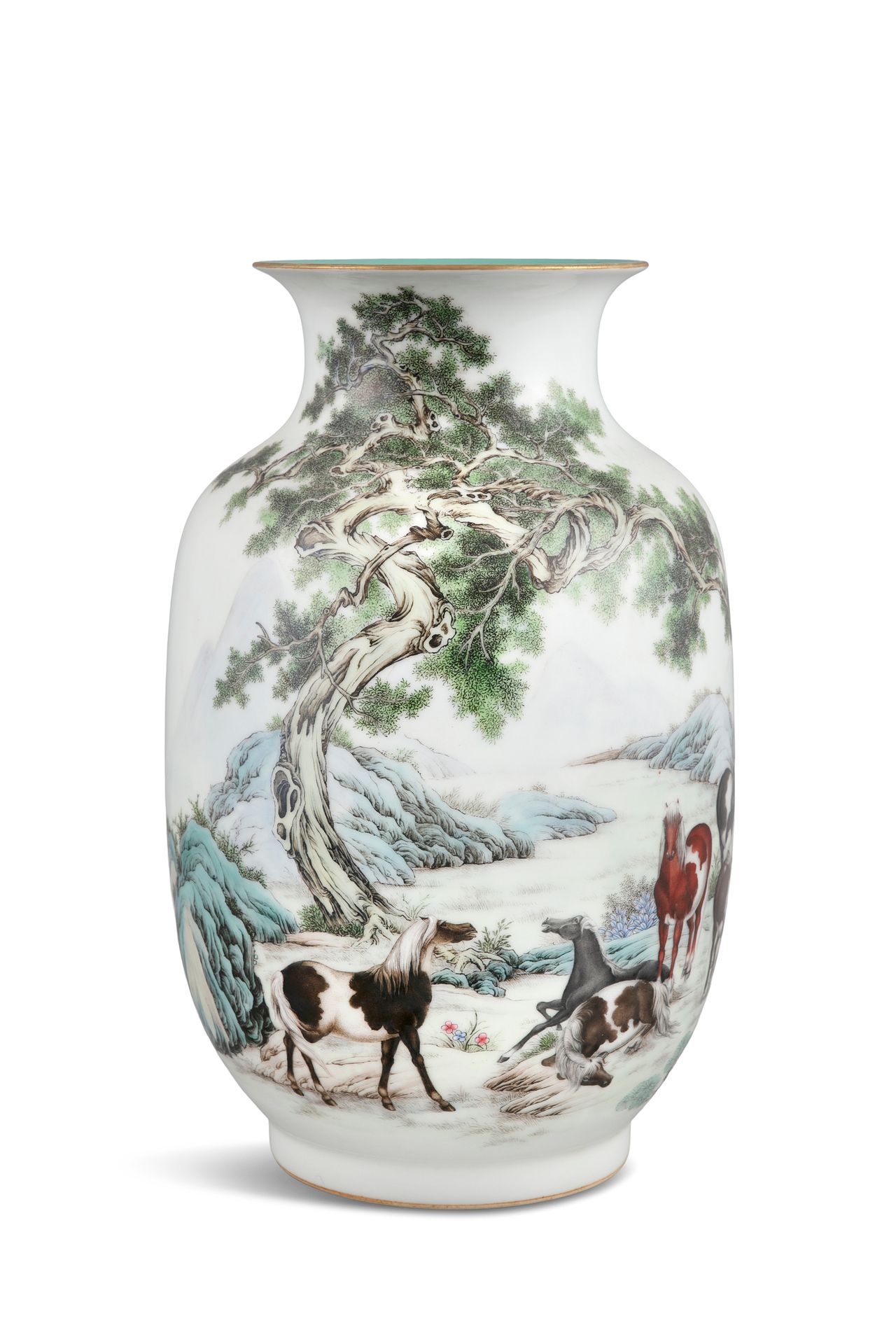Description
A LARGE FAMILLE ROSE PALETTE ‘EIGHT HORSES OF WANG MU’ PORCELAIN LANTERN VASE, THE DESIGN AFTER GIUSEPPE CASTIGLIONE (1688-1766) ALSO KNOWN AS LANG SHINING 郎世宁 China, 20th century The front part finely painted with eight horses in various positions amidst a landscape and below a pine tree, the back part inscribed with a poetry completed by three apocryphal red seals of Lang Shining. The below all covered in turquoise enamel but for the central square within which is an apocryphal cobalt blue six character seal / zhuanshu mark of the Emperor Qianlong. H: 33 cm Notes: 1. The story of The Eight Horses of King Mu of the Zhou Dynasty originates from a historical romance, The “Mu Tianzi Zhuan”(lit. “An Account of Emperor Mu”), which describes the journeys of the fifth emperor of the Zhou dynasty (1023-983 BC) during which he met Xi Wangmu, i.e. the Queen Mother of the West. 2. The depiction of the horses is inspired from The “Tu Cheng Bai Jun” (lit. “The One Hundred Horses Scroll”, preserved in the National Palace Museum in Taipei, Taiwan. 粉彩“穆王八骏图”大花瓶 中国,20世纪 [INTERNET KEYWORDS] CHINA, CHINESE, QING, ANTIQUE, CERAMIC, PORCELAIN, PAINTING, SCROLL, JADE, DYNASTIE, JAPANESE, VIETNAMESE
176
A LARGE FAMILLE ROSE PALETTE ‘EIGHT HORSES OF WANG MU’ PORCELAIN LANTERN VASE, THE DESIGN AFTER GIUSEPPE CASTIGLIONE (1688-1766) ALSO KNOWN AS LANG SHINING 郎世宁 China, 20th century The front part finely painted with eight horses in various positions amidst a landscape and below a pine tree, the back part inscribed with a poetry completed by three apocryphal red seals of Lang Shining. The below all covered in turquoise enamel but for the central square within which is an apocryphal cobalt blue six character seal / zhuanshu mark of the Emperor Qianlong. H: 33 cm Notes: 1. The story of The Eight Horses of King Mu of the Zhou Dynasty originates from a historical romance, The “Mu Tianzi Zhuan”(lit. “An Account of Emperor Mu”), which describes the journeys of the fifth emperor of the Zhou dynasty (1023-983 BC) during which he met Xi Wangmu, i.e. the Queen Mother of the West. 2. The depiction of the horses is inspired from The “Tu Cheng Bai Jun” (lit. “The One Hundred Horses Scroll”, preserved in the National Palace Museum in Taipei, Taiwan. 粉彩“穆王八骏图”大花瓶 中国,20世纪 [INTERNET KEYWORDS] CHINA, CHINESE, QING, ANTIQUE, CERAMIC, PORCELAIN, PAINTING, SCROLL, JADE, DYNASTIE, JAPANESE, VIETNAMESE
